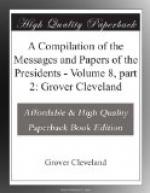SIXTH ANNUAL ADDRESS.
UNITED STATES, November 19, 1794.
Fellow-Citizens of the Senate and of the House of Representatives;
When we call to mind the gracious indulgence of Heaven by which the American people became a nation; when we survey the general prosperity of our country, and look forward to the riches, power, and happiness to which it seems destined, with the deepest regret do I announce to you that during your recess some of the citizens of the United States have been found capable of an insurrection. It is due, however, to the character of our Government and to its stability, which can not be shaken by the enemies of order, freely to unfold the course of this event.
During the session of the year 1790 it was expedient to exercise the legislative power granted by the Constitution of the United States “to lay and collect excises.” In a majority of the States scarcely an objection was heard to this mode of taxation. In some, indeed, alarms were at first conceived, until they were banished by reason and patriotism. In the four western counties of Pennsylvania a prejudice, fostered and imbittered by the artifice of men who labored for an ascendency over the will of others by the guidance of their passions, produced symptoms of riot and violence. It is well known that Congress did not hesitate to examine the complaints which were presented, and to relieve them as far as justice dictated or general convenience would permit. But the impression which this moderation made on the discontented did not correspond with what it deserved. The arts of delusion were no longer confined to the efforts of designing individuals. The very forbearance to press prosecutions was misinterpreted into a fear of urging the execution of the laws, and associations of men began to denounce threats against the officers employed. From a belief that by a more formal concert their operation might be defeated, certain self-created societies assumed the tone of condemnation. Hence, while the greater part of Pennsylvania itself were conforming themselves to the acts of excise, a few counties were resolved to frustrate them. It was now perceived that every expectation from the tenderness which had been hitherto pursued was unavailing, and that further delay could only create an opinion of impotency or irresolution in the Government. Legal process was therefore delivered to the marshal against the rioters and delinquent distillers.
No sooner was he understood to be engaged in this duty than the vengeance of armed men was aimed at his person and the person and property of the inspector of the revenue. They fired upon the marshal, arrested him, and detained him for some time as a prisoner. He was obliged, by the jeopardy of his life, to renounce the service of other process on the west side of the Allegheny Mountain, and a deputation was afterwards sent to him to demand a surrender of




